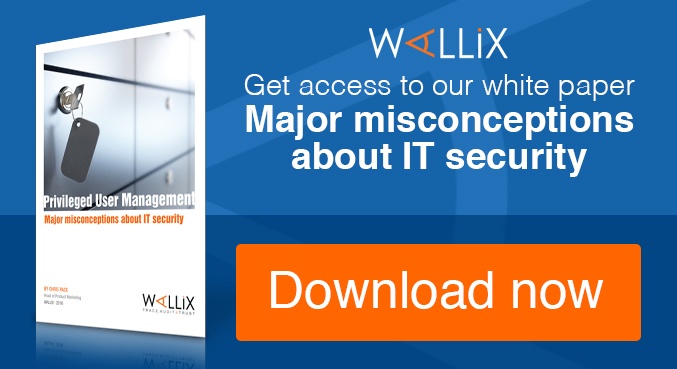The key objective of any CISO (Chief Information Security Officer) is the prevention of impact to the organization from any form of security breach. This, as we know, is much easier said than done. A good CISO, in fact, comes to work every morning assuming that a breach has already happened, with a view to fixing any vulnerabilities and securing the system to the highest standard possible. Every single day.
3 Questions CISOs Should Really Be Asking
[fa icon="calendar'] Apr 10, 2019 11:45:14 AM / by WALLIX posted in Preventing Insider Threat, Reaching IT Compliance, Improving Cybersecurity
What is the Principle of Least Privilege and How Do You Implement It?
[fa icon="calendar'] Jan 22, 2019 12:27:05 PM / by WALLIX posted in Preventing Insider Threat, Improving Cybersecurity
In the military, they have a well-known phrase that happens to succinctly describe the definition of the least privilege principle: ‘Need-To-Know Basis’. For the military, this means that sensitive information is only given to those who need that information to perform their duty. In cybersecurity, it’s much the same idea. The ‘least privilege’ principle involves the restriction of individual user access rights within a company to only those which are necessary in order for them to do their job. By the same token, each system process, device, and application should be granted the least authority necessary, to avoid compromising privileged information.
Uniting Identity Access Management (IAM) and PAM for Cohesive Identity Governance
[fa icon="calendar'] Sep 5, 2018 11:22:37 AM / by WALLIX posted in Preventing Insider Threat, Improving Cybersecurity
This month marks the 25th anniversary of the famous “On the Internet, no one knows you’re a dog” cartoon appearing in The New Yorker. Oh, how true that was, and still is, a quarter century later. Chances are, artist Peter Steiner had no idea how prescient his drawing was. We are indeed in the Internet dog days, of identity access management (IAM) and PAM at least.
The Critical Elements of a Scalable PAM Solution
[fa icon="calendar'] Aug 28, 2018 9:00:00 AM / by WALLIX posted in Controlling Third Party Access, Improving Cybersecurity
An organization’s security posture benefits from the ability to manage and track access to privileged accounts. Privileged users—as well as those impersonating them—can present major security threats. A Privileged Access Management (PAM) solution offers an answer. It enables security teams to stay on top of privileged account access. To work, however, it must be a scalable PAM solution. The PAM solution must scale flexibly in a growing organization or suffer being disused, to the detriment of security overall. What does it take to build a scalable PAM solution? This article explores the answer to that question.
Supply Chain Management and Supply Chain Security: Addressing Vulnerabilities with PAM
[fa icon="calendar'] Aug 14, 2018 9:02:00 AM / by WALLIX posted in Improving Cybersecurity
Supply chains are essential for the proper functioning of industrial systems and critical infrastructure. However, they’re also quite messy, in terms of security. Supply chains invariably connect users and systems from multiple entities, often in different countries. This setup exposes every company in the supply chain to cyber risk. Among countermeasures, Privileged Access Management (PAM) offers one of the best ways of minimizing supply chain vulnerabilities.








